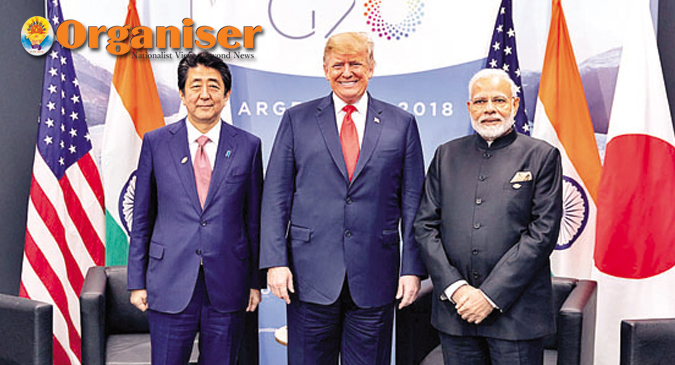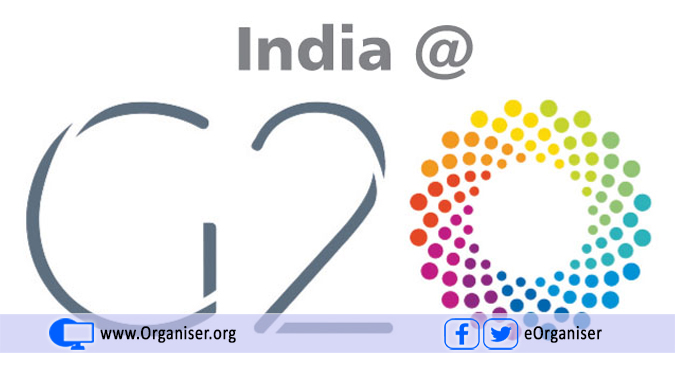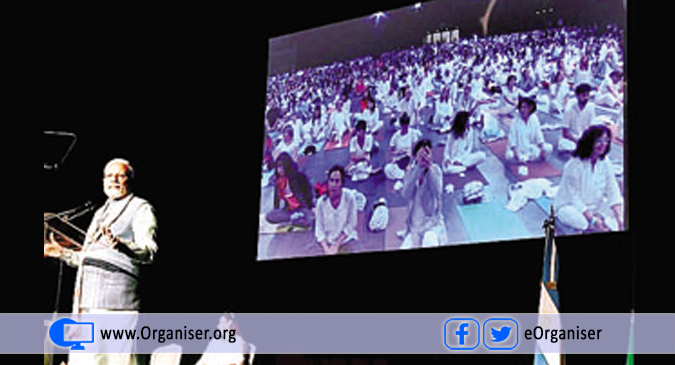Steeped in the five-dimensional mooring of ‘Panchamrit’, encompassing touchstone elements of dialogue, mutual-respect, common-security, shared-prosperity, and civilisational traditions, PM Modi has implied a sustained foreign policy approach that congruently melds the flagship domestic developmental priorities with national interest imperatives
As the recently concluded G20 rolled-in, it was greeted with a slew of contretemps on the global horizon, straddling the gamut from economic management to governance compact. The anxieties stemming from the lingering US-China tariff war to vexatious EU’s uncertainties over the BREXIT, through to the latest tiff in US-Russia ties over the latter’s shadowy actions in Ukraine, and the global indignation over the Saudi Crown Prince’s impunity threatened to cast a pall over multilateral summit at Argentina’s maiden hosting of what marks the second largest annualised Summit level congregation of global leaders, behind the capstone UNGA session. Yet, amidst the chequered narrative and the onerous baggage that each sovereign nations brought to the high-table was India finding itself in a prestigious space which is coveted by the encomium of nations as the singular bright spot in the international economic milieu; much sought-after as a dynamic strategic partner for advancing the agenda of global powers and perceived as a credible voice to articulating a progressive vision for current vistas and new frontiers of socio-economic sustainable development, over two days of flurried political and diplomatic interaction. Nothing empirically exemplifies this better than PM Narendra Modi basking in the glory to thank his peers at the high-table for acquiescing to India’s intended plan to host the 17th edition of arguably the world’s most influential global summit in India in 2022, just to coincide with the 75th anniversary of India’s Independence!

Prime Minister Narenda Modi participating in a trilateral meeting on November 30, 2018c with President Donald Trump and Japanese Prime Minister Shinzo Abe at the G20 Summit in Buenos Aires, Argentina
All this wasn’t serendipity or fate but maybe veritably imputed to the purposeful design of India’s assiduously-cultivated statecraft in the external realm over the past five years. Steeped in the five-dimensional mooring of ‘Panchamrit’, encompassing touchstone elements of Samvaad (dialogue), Samman (mutual-respect), Suraksha (security), Samruddhi (shared-prosperity), and Sabhyata evam Sanskriti (civilisational traditions), it has implied a sustained foreign policy approach that melds the flagship domestic developmental priorities with national interest imperatives,for effective external action.
At the thirteenth G20 Summit, Modi identified the Trinity themes of the ‘Future of Work’, ‘Infrastructure for Development’ and ‘Sustainable Food Future’, with his commandeering presence and his role at the Summit. Through lead intervention and mooting of outcome-oriented action plans, he underscored New Delhi’s conviction-reposed alignment with the strategic priorities. In a refreshing breath of fresh air, away from the perennial bane and refrain of Indian foreign policy, often witnessed in the past as not materially contributing to the global trajectory of discourse and attendant consensual decision-making, partly out of diffidence but equally on account of dearth of cognition.

G 20 logo
As the G20 has evolved, so has India. One can vividly recall how President Bush invited former PM Manmohan Singh to Washington DC, where the mooting of the G20 framework was broached with him in late 2008, signalling India’s key locus, in the conceptualising of this global forum, for coordinated, pluralised in-concert sovereign responses to multilateral challenges. It wasn’t until Prime Minister Modi’s maiden appearance at the G20 in Brisbane, Australia in November 2014 that India had marked its presence in substance over form when the Indian priority of a concerted inexorable collective action against black money found resonance with the grouping such that it triggered a multi-nation leather-hunt for illicitly=stashed fiduciary resources, with undulating outcomes, of course. Four years on, at the recently concluded G20, India’s nine-point proposal for robustly bringing down economic offenders and white-collar fugitives through harmonising prosecuting standards and streamlining oversight procedures, was a vestige of Indian diplomatic pertinacity with avowed objectives, and the ability to pin them down to the global mast, so-to-speak.

PM Modi addresses ‘Yoga for Peace’ event in Buenos Aires
Addressing ‘Yoga for Pace’ event in Buenos Aires, PM Narendra Modi said that yoga guarantees health as well as wellness. “Yoga means ‘to connect’. It connects us with wellness, it connects is with happiness”, said PM Modi.
In a similar vein, New Delhi’s ability to drive home the argument for cogent coordinated action to combat the scourge of terror, not merely through intelligence-sharing and joint-mechanisms for counter-terrorism but also in stamping out the financial links of terror, demanding greater accountability from the Financial Action Task Force (FATF), that has Islamabad hanging by a thread through the grey-list designation, which came about after China and Saudi Arabia relented; both of whom are hemmed-in, within the G20, too. Despite conventional wisdom that would question New Delhi’s logic in iterating the issue of terror on the BRICS platform, yet the fact that Prime Minister Modi did to India’s prioritized concern over Pak-sponsored terror that President Xi would perfunctorily do, in respect of the predatory Belt-n-Road Initiative (B&RI), which is to unabashedly leave no stage unturned, to articulate one’s persuaded concern, leading to an eliciting of shared interest within the Joint Statement emerging out of the informal BRICS breakfast confabulation, speaks volumes, to the tact and the resolve.
Even though the G20 has a decently good track record of ensuring that rolling proposals and morphing initiatives are brought on-stream, to the tune of about seventy per cent, it remains a fact that such Summits quintessentially provide rudimentary strategic direction and coagulate political will, even as the nitty-gritty, are left to the labyrinth of working groups, technical committees, and inter-agencies, of officialdom. This said, through forward-looking ideas spanning disaster resilient infrastructure to indemnifying for food and energy security, to putting a premium on staying the course on the Paris Accord towards mitigating climate change and fostering socially inclusive development through the enhanced intermediation of fin-tech, all the way to commending a fervent call for expanding membership of the Indo-French collaborative initiative of the India-based International Solar Alliance (ISA), and widening of its scope, to reach beyond the twin geographical ‘Tropics’, India and Prime Minister Modi, have been at the vanguard of nudging the configuration, and content of the global governance dossier and shaping the deliverance of strategic guidance.
Given that the annualised Summitry of this kind, convenes, not just the echelon-principals from the constituent-sovereigns, but also draws participation, from invitee nations, and heads of global and regional multilateral organisations, institutions and agencies, that form part of the inter-state architectural firmament, attention and mind-space invariably grovels, to search for the hue and format of interactions, that transpire, on the margins of the G20. And here, there were even greater takeaways for India, during the twenty-five-meetings-over-fifty-hours-blitz, that Prime Minister Modi has now become, quite inured-to, on his travel travails. While global attention was predominantly focussed on ascertaining the outcome of Trump-Xi trade talks, amidst fears that a no-news meeting would shear-off three quarters of one per cent of accretion to global growth, what made prominent news in its own regard, was the commonality of India in the convening of two key trilateral formations, one in vogue, viz., the Japan-US-India; and the other, the Russia-India-China (R-I-C)resuscitated from hibernation, in more ways than one. While the former is a comprehensible scale-up from institutionalised Foreign Ministers meetings at the UNGA, and whose rationale is incandescently seeded in the shared articulation of an Indo-Pacific geopolitical strategic construct, yet, the fact that Prime Minister Modi’s continually blossoming chemistry, with both President Putin (to whose request for the R-I-C meeting he acceded-to), and President Xi, with whom his separate bilateral, marked the fourth time they had engaged in a formal, structured sit-down, inside seven months from the much-touted Wuhan schmooze back in April, spurred the resurrection of the R-I-C, after twelve yawning years, shows New Delhi in a prided position of being courted, by major powers on its periphery and in the extant alike, and it being cast in the mould of a nifty-balancer and dynamic-bridge to buttressing strategic stability and equilibrium, between the two sets of formations, militating on different trajectories.
There is no doubt that a slick streak of pragmatism has been hard at work under the Modi dispensation, amply on display at the G20 in Argentina. Although the perceived snub of a declined invite to be the Republic Day Chief Guest, Prime Minister Modi side-stepped the urge to seek to impose a bilateral upon President Trump. PM spoke effusively about Indo-US cooperation in the context of the three-way partnership christened as J-A-I (alongside Japan), even as Defence Minister Sitharaman was imminently due in DC, to take the defence compact forward. Similarly, in an all-to-familiar throwback to the past, New Delhi would have steered clear of a three-way sit-down with China, particularly since being just over a year into a post-Doklam defuse. But then, ensuring that India is relevant and influential a strategic periphery being increasingly shaped in tandem by Beijing and Moscow, potentially adversarial to New Delhi, could not be allowed to fructify, at the altar of diplomatic obstinacy and stilted and muddled thinking. The only other India-comprising multilateral format meeting which could have happened but was not pencilled-in or even attempted for, was the ‘G-04’, on UN Security Council Permanent Membership Reform, which would in the standard scheme of things, raise some eyebrows, even as one could discern a method to this madness of omission. The prospect of UNSC reform is not on the anvil and stirring the pot at this stage would have not only antagonised Rome, whose cooperation was needed to swap hosting of the G20 from 2021 to 2022, and would have riled a China, potentially scuppering the R-I-C and even queering the rumoured pitch of India coveting a UNSC Non-Permanent Seat, during the 2021-22 slot.
As Indo-Argentine diplomatic relations complete seven decades, it was a testament to the warmth and affability of the two leaders, that President Macri hosted Prime Minister Modi for a breakfast meeting at the Presidential Palace, just the second leader outside of President Trump to have been hosted at the Palace, during this G20. Given the Argentine President’s impending State Visit to India in January 2019, that the interaction coalesced around a broad-bush conversational understanding of relational issues. But the meeting with the Chilean President Sebastien Pinera, was meaningful at a time when India has come in internationally second, only behind Chile, in the latest ClimateScope Report, that tracks the pecking order of sovereigns, as global leaders, in the cross-cutting endeavour, to transition to Renewables. Prime Minister Modi and his tectonically transforming reforms at home and statesmanship on the world stage, have come in for abidingly effusive praise from varied quarters, none less, than from the triumvirate of global institutional honchos, of the likes of President Jim Yong Kim of the World Bank, IMF Managing Director Christine Lagarde and incumbent UN Secretary-General Antonio Gutierres. But by their exalted standards, it must have been some revelation for the UN Chief, to be told, in no uncertain terms by the Prime Minister that his and his nation’s commitment, to an ecologically conscious and sustainable environment, draws inspiration and emanates from the Vedas.
(The writer is Asst. Professor, Centre for Latin American & International Studies, Goa University; Faculty, John Naisbitt University)














Comments